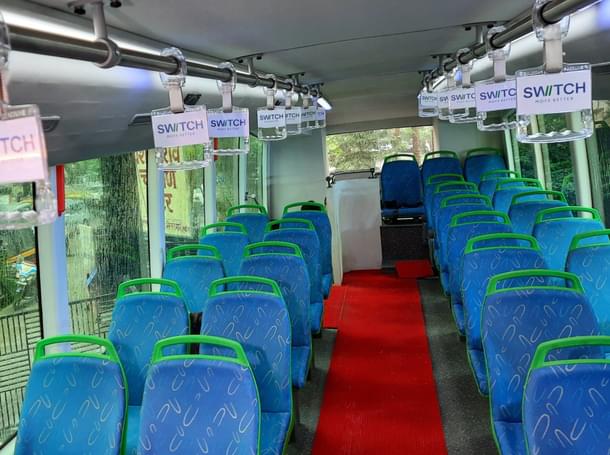Infrastructure
Maharashtra: Electric Double-Decker Buses To Ply On Mumbai Roads From January 2023
India Infrahub
Dec 04, 2022, 02:19 PM | Updated 02:19 PM IST
Save & read from anywhere!
Bookmark stories for easy access on any device or the Swarajya app.


The Brihanmumbai Electricity Supply and Transport (BEST) will launch its premium e-bus service this month and roll out double-decker e-buses in January 2023, an official said.
The approvals for double-decker e-buses are in the final stages and will be completed soon, BEST general manager Lokesh Chandra told media persons on Friday.
At least 10 double-decker e-buses will be rolled out on January 14, 2023 and the fleet will be gradually increased to 50 in the first phase, he said.
Later this month, the BEST has decided to launch its premium single-decker e-bus services, for which passengers will be able to reserve their seats through an app, the official said.
The transport authority also plans to start taxi services with 500 electric vehicles by June next year and has already floated tenders for it, he said.
People can book these cabs through the Chalo app, which is currently being used for ticketing and live tracking of its buses, the official added.
The BEST provides bus service to Mumbai and its surrounding areas, and has a fleet of around 3,500 buses, including more than 400 e-buses.
Iconic red double-decker buses of Mumbai
On July 15, 1926, Mumbai saw its first bus run to ease the traffic situation in the city. For many years, buses were regarded as a mode of transportation for the upper middle class.
Double-decker buses were introduced in 1937 to keep up with the growing traffic. They were based on the motorised double-decker buses of London.
The first Limited Bus service in Mumbai, possibly the first in the country, began running between Colaba and Mahim in 1940.

By the 1960s, 26 bus routes were operating throughout Mumbai. The buses had become one of the city's most distinguishing features. They are more popular with tourists and locals alike.
It was not until 1955 that an Indian firm, Ashok Leyland, began producing them.
Before that, buses were all produced by foreign companies like Daimler, AEC (Associated Equipment Company), and Leyland Motors because they were all launched during the British administration.
BEST phased out these buses mainly because spare parts were scarce, and they were more expensive to buy. They were also cumbersome to transport, leading to many difficulties.
Double-deckers were also becoming economically unviable because of their high fuel consumption.
Reintroduction of double-decker buses in electric form
In August, Ashok Leyland's electric vehicle arm, Switch Mobility, unveiled India's first and unique electric double-decker air-conditioned bus 'Switch EiV 22.'
Designed, developed and manufactured in India and utilising Switch's global electric bus experience, Switch EiV 22 is equipped with the latest technology, ultra-modern design, highest safety and best-in-class comfort features.

It has a lightweight aluminium body construction, which offers a higher passenger-to-weight ratio and a competitive cost per km per passenger.
It can ferry nearly twice the number of seated passengers as a comparable single-decker bus with just an 18 per cent increase in kerb weight.
Powering Switch EiV 22 is a 231 kWh capacity, 2-string, liquid-cooled, higher density NMC chemistry battery pack with a dual gun charging system.
This battery pack enables the electric double decker to have a range of up to 250 km for intra-city applications.
Switch India has already secured an order of 200 electric double-decker buses in Mumbai.





